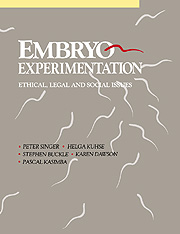Book contents
- Frontmatter
- Contents
- Foreword
- ACKNOWLEDGEMENTS
- INTRODUCTION
- PART 1 THE SCIENTIFIC ISSUES
- PART 2 THE ETHICAL ISSUES
- ARGUMENTS ABOUT THE STATUS OF DIFFERENT DEVELOPMENTAL STAGES
- ARGUMENTS FROM POTENTIAL
- EMBRYO RESEARCH AND WOMEN
- PART 3 CONTROLLING EMBRYO EXPERIMENTATION IN A DEMOCRATIC SOCIETY
- FORMING A PUBLIC POLICY
- 13 Community control of IVF and embryo experimentation
- 14 IVF regulation: The search for a legal basis
- 15 Self-regulation and embryo experimentation in Australia: A critique
- 16 Public policy in a pluralist society
- LEGISLATION AND ITS PROBLEMS
- APPENDICES
- GLOSSARY
- NOTES ON CONTRIBUTORS
- INDEX
13 - Community control of IVF and embryo experimentation
Published online by Cambridge University Press: 05 June 2012
- Frontmatter
- Contents
- Foreword
- ACKNOWLEDGEMENTS
- INTRODUCTION
- PART 1 THE SCIENTIFIC ISSUES
- PART 2 THE ETHICAL ISSUES
- ARGUMENTS ABOUT THE STATUS OF DIFFERENT DEVELOPMENTAL STAGES
- ARGUMENTS FROM POTENTIAL
- EMBRYO RESEARCH AND WOMEN
- PART 3 CONTROLLING EMBRYO EXPERIMENTATION IN A DEMOCRATIC SOCIETY
- FORMING A PUBLIC POLICY
- 13 Community control of IVF and embryo experimentation
- 14 IVF regulation: The search for a legal basis
- 15 Self-regulation and embryo experimentation in Australia: A critique
- 16 Public policy in a pluralist society
- LEGISLATION AND ITS PROBLEMS
- APPENDICES
- GLOSSARY
- NOTES ON CONTRIBUTORS
- INDEX
Summary
Everyone recognizes that the new reproductive technologies have profound implications for the whole community and that the community has a right to exercise some kind of surveillance and control over what takes place in this new and volatile area of medical research and practice. There are, however, large and deep differences about how that control should best be exercised.
Why should there be any kind of legislative regulation or control of IVF and related research? Why not leave the control of the new reproductive technologies in the hands of the medical scientists and the scientific and medical societies? Robert Edwards, the father of IVF, for example, has opposed the idea of legislation with respect to the research and clinical aspects of human embryology. ‘It would’, he argues, ‘be far better to leave standards of practice primarily to the scientific and medical societies … In this way, new procedures can be adapted to the public need, and unacceptable methods can be suppressed’. Sir Gustav Nossal also objects to legal controls in this area: ‘We must’, he says, ‘use the soft-edged, untidy, polyvalent methods of a free and decent society’. In essence, Nossal argues, apart from the protection of the common law, we should leave the regulation of biotechnology to the scientific community itself with its own network of safeguards and controls and guidelines.
- Type
- Chapter
- Information
- Embryo Experimentation , pp. 147 - 152Publisher: Cambridge University PressPrint publication year: 1990
- 1
- Cited by



